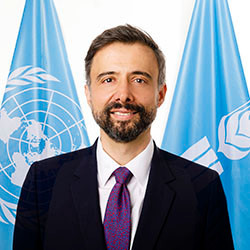Conferencia de prensa del Consejo de Gobernadores 2024
IFAD Asset Request Portlet
Publicador de contenidos
Conferencia de prensa del Consejo de Gobernadores 2024
Declaración a los medios de Álvaro Lario, Presidente del FIDA
Por Alvaro Lario
Lugar: IFAD HQ, Roma, Italia
14 febrero 2024Dear Members of the media,
Welcome to IFAD. We are very happy to have you with us today. Small-scale farmers are critical to global stability and food security. They deserve our fullest attention.
Small-scale farmers produce a third of the world’s food supply, and in low and middle-income countries, over two-thirds.
3 billion people live in rural parts of developing countries, and they rely to a large extent on small-scale farming and agricultural to eat and to make a living.
But small-scale farmers receive less than 1 percent of global climate finance. Those responsible in huge part for how the world lives and eats are left on the frontlines of climate change, coping as best they can, but often living themselves in hunger and poverty.
This needs to change because the warning bells are sounding and climate change is accelerating.
Despite our best efforts to reach zero hunger under the second Sustainable Development Goal, hunger is not going away. 735 million people do not have enough food, up by 122 million since before the pandemic. We are going in the wrong direction and the major drivers of hunger - conflict and climate change - are increasing.
Violent conflict has spiked dramatically in several regions. By 2030, almost 60 percent of the world's poor will live in countries classified as fragile or affected by conflicts. As global temperatures continue to rise, leading to worse living conditions for millions of people worldwide, the poorest are the most vulnerable and will be the most severely impacted. Today close to 700 million people live in extreme poverty.
We need to do things differently to ensure a food-secure and stable future for everybody. We need a systemic change.
We need new ways of thinking, new technologies, and new global partnerships that can drive positive change at scale.
At IFAD we promote the kinds of innovations that serve small-scale farmers and help them to increase their productivity, their resilience to shocks and their access to markets, information and financial services.
Let me give you a couple of brief examples:
One of IFAD’s most exciting innovations in the finance space is ARCAFIM, the Africa Rural Adaptation Finance Mechanism. Thanks to a combination of public and private finance, we provide local banks in Africa with credit lines - to in turn lend money to farmers to adapt to climate change.
With the Inter-American Development Bank, we are developing digital wallets for small-scale farmers using blockchain to better protect personal data and drastically reduce transaction costs. Digital wallets foster financial inclusion which is essential for small-scale farmers to grow their businesses.
With a consortium of other International Financial Institutions, The Consultative Group on International Agricultural Research (CGIAR) and the World Food Programme (WFP), IFAD is supporting artificial intelligence solutions to build climate resilience in rural areas - including a Voice Companion app that delivers instant, localised and climate-smart agriculture information in local languages.
Other AI-based solutions include a device that enables small-scale farmers to detect and predict crop pests and pathogens that put their crops at risk, and another that predicts yields and detects diseases. All devices contribute to enhanced food security.
But to help drive innovations that ensure small-scale farmers have equitable access to information and guidance that can help improve seeds and yields, we need investments.
We are funded largely through our member states and throughout our funding replenishment last year, we called on world leaders to pledge ambitiously. Our call was heard. We have so far received over 1.1 billion dollars, a record at this stage of our replenishment process. Thirty-seven Member States made their highest pledge ever. But we need to go further and our ambition is to reach 2 billion dollars, which we will put to use supporting the world’s most vulnerable communities
Fighting hunger is an urgent and collective goal. Developing countries should also invest far more in their own agriculture, despite a challenging financial and debt context. Investing in small-scale farmers goes a long way because it is an investment in food security, biodiversity and stability for all of us.
Thank you
